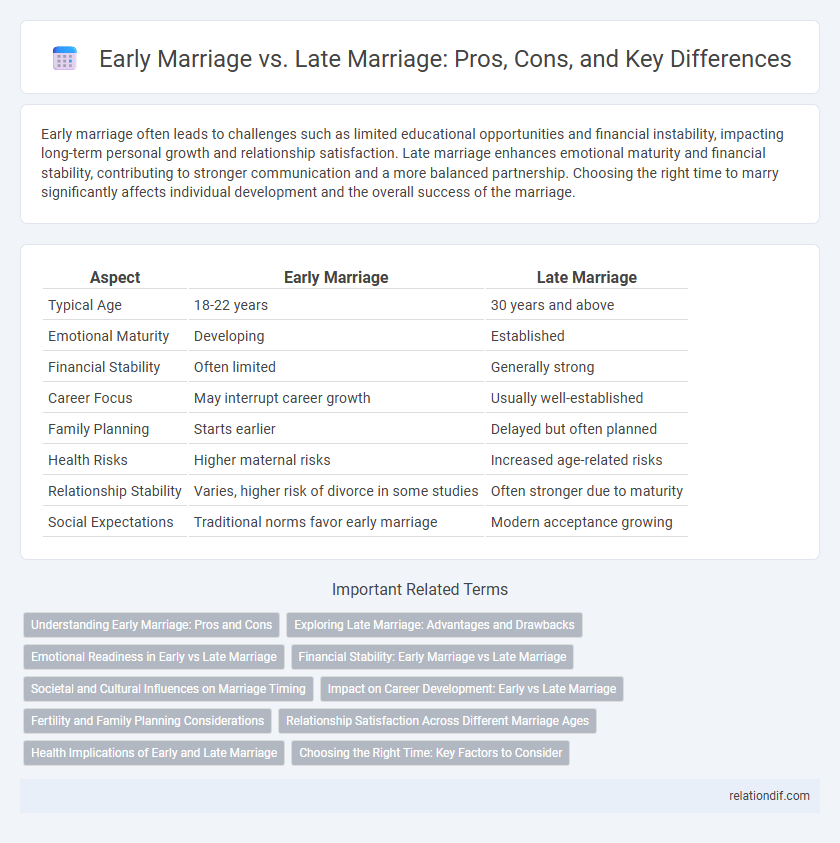Early marriage often leads to challenges such as limited educational opportunities and financial instability, impacting long-term personal growth and relationship satisfaction. Late marriage enhances emotional maturity and financial stability, contributing to stronger communication and a more balanced partnership. Choosing the right time to marry significantly affects individual development and the overall success of the marriage.
Table of Comparison
| Aspect | Early Marriage | Late Marriage |
|---|---|---|
| Typical Age | 18-22 years | 30 years and above |
| Emotional Maturity | Developing | Established |
| Financial Stability | Often limited | Generally strong |
| Career Focus | May interrupt career growth | Usually well-established |
| Family Planning | Starts earlier | Delayed but often planned |
| Health Risks | Higher maternal risks | Increased age-related risks |
| Relationship Stability | Varies, higher risk of divorce in some studies | Often stronger due to maturity |
| Social Expectations | Traditional norms favor early marriage | Modern acceptance growing |
Understanding Early Marriage: Pros and Cons
Early marriage can foster strong family bonds and provide emotional stability, especially in cultures emphasizing traditional values and early responsibility. However, it often poses risks such as limited educational opportunities, increased financial insecurity, and higher chances of marital discord due to immature decision-making. Balancing these pros and cons is crucial for individuals and families navigating the timing of matrimony.
Exploring Late Marriage: Advantages and Drawbacks
Late marriage often allows individuals to achieve greater emotional maturity and financial stability, contributing to more balanced relationship dynamics and long-term satisfaction. However, delayed partnerships may face challenges such as decreased fertility and societal pressures, which can impact family planning and social integration. Balancing career goals and personal aspirations with relationship commitments remains a crucial consideration in late marriage decisions.
Emotional Readiness in Early vs Late Marriage
Emotional readiness plays a critical role in the success of both early and late marriages, with individuals in late marriage often exhibiting greater emotional maturity and stability. Early marriage may face challenges due to underdeveloped emotional skills, impacting conflict resolution and long-term relationship satisfaction. Research indicates that couples marrying later tend to experience stronger emotional connections and resilience, contributing to higher marital satisfaction rates.
Financial Stability: Early Marriage vs Late Marriage
Early marriage often faces financial instability due to limited income and career development, increasing stress and economic challenges for couples. Late marriage benefits from more established careers and higher savings, providing greater financial security and resources for family planning. Financial stability in late marriage supports long-term investments and better quality of life, reducing economic pressures encountered in early unions.
Societal and Cultural Influences on Marriage Timing
Societal norms and cultural traditions heavily dictate the timing of marriage, with some communities promoting early marriage to preserve family honor and maintain social structures. In contrast, cultures that prioritize education and career development often encourage late marriage, viewing it as a pathway to greater economic stability and personal growth. These divergent cultural paradigms influence individual decisions, reflecting the complex interplay between societal expectations and evolving values regarding marriage timing.
Impact on Career Development: Early vs Late Marriage
Early marriage often limits career opportunities due to increased family responsibilities and potential interruptions in education or skill acquisition. Late marriage tends to correlate with greater career development, as individuals usually establish professional stability and skills before committing to family life. Research indicates that delaying marriage allows for higher earning potential and career advancement, especially for women.
Fertility and Family Planning Considerations
Early marriage often correlates with higher fertility rates due to a longer reproductive window, but it may pose health risks and limit effective family planning. Late marriage typically allows for better education and career establishment, enabling informed decisions on contraception and planned childbearing. Balancing fertility goals with health and socioeconomic factors is crucial in family planning strategies related to marriage timing.
Relationship Satisfaction Across Different Marriage Ages
Relationship satisfaction varies significantly between early and late marriages, with studies showing that couples who marry later often report higher levels of communication, emotional intimacy, and overall contentment. Early marriages can face challenges such as financial instability and immature conflict resolution skills, which may negatively impact relationship quality. Demographic data indicates that individuals marrying after age 30 experience greater relationship stability and lower divorce rates, contributing to enhanced long-term satisfaction.
Health Implications of Early and Late Marriage
Early marriage often leads to increased risks of maternal mortality, reproductive health complications, and higher rates of infant mortality due to biological and physiological immaturity. Late marriage, while reducing such early health risks, may be associated with challenges like decreased fertility and increased risk of pregnancy complications such as gestational diabetes and hypertension. Understanding the health implications of marriage timing is crucial for public health policies aimed at improving maternal and child health outcomes.
Choosing the Right Time: Key Factors to Consider
Choosing the right time for marriage involves evaluating emotional maturity, financial stability, and personal goals. Early marriage may offer the advantage of growing together, while late marriage often provides increased life experience and career establishment. Prioritizing compatibility, communication, and shared values is essential regardless of age to ensure a strong, lasting partnership.
Early Marriage vs Late Marriage Infographic

 relationdif.com
relationdif.com